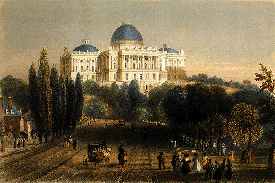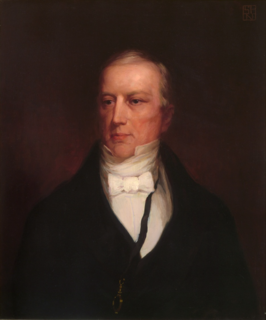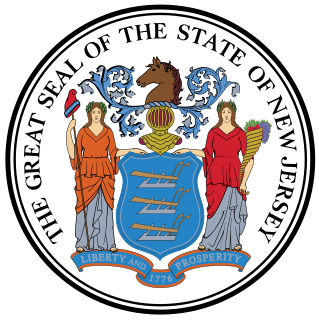
The 21st United States Congress was a meeting of the legislative branch of the United States federal government, consisting of the United States Senate and the United States House of Representatives. It met in Washington, D.C. from March 4, 1829, to March 4, 1831, during the first two years of Andrew Jackson's presidency. The apportionment of seats in the House of Representatives was based on the Fourth Census of the United States in 1820. Both chambers had a Jacksonian majority.

In the United States House of Representatives elections in 1828 and 1829, the Jacksonians soundly took control of the presidency, with Andrew Jackson's victory, and greatly increased their majority in Congress. Outgoing President John Quincy Adams's unpopularity played a major role in the Jacksonian pick-up, as did the perception of the Anti-Jacksonian Party as urban and elitist. Major increases in suffrage also heightened Jacksonian wins, as newly enfranchised voters tended to associate with Jacksonian principles. The Anti-Masonic Party, a single issue faction based on distrust of Freemasonry, became the first third party in American history to garner seats in the House.
From 1793 to 1827 and again from 1829 to 1845, Georgia elected all its Representatives in Congress from a single multi-member at-large congressional district.
In the United States Senate elections of 1828 and 1829, the Jacksonian coalition, despite its leader's victory in the presidential election, lost a seat in the Senate to the opposing Anti-Jacksonian coalition.

Massachusetts elected its members November 7, 1828.

Delaware re-elected its sole member October 7, 1828.

Indiana elected its members August 4, 1828, swapping a Jacksonian and Anti-Jacksonian but retaining its 2-1 Anti-Jacksonian majority.

Louisiana elected its members July 8–10, 1828.

Mississippi elected its sole member at-large August 4–5, 1828.

New Jersey elected its members November 4, 1828.

New York elected its members November 3–5, 1828.

Ohio elected its members October 14, 1828.

South Carolina elected its members October 13–14, 1828.

Alabama elected its members August 3, 1829 after the term began but before Congress convened.

Connecticut elected its members April 29, 1829 after the term began but before Congress convened.

Kentucky elected its members August 3, 1829, after the term began but before the new Congress convened.

Maryland elected its members October 5, 1829 after the term began but before Congress convened.

North Carolina elected its members August 13, 1829 after the term began but before Congress convened.

The 1828 United States elections elected the members of the 21st United States Congress. It marked the beginning of the Second Party System, and the definitive split of the Democratic-Republican Party into the Democratic Party and the National Republican Party. While the Democrats cultivated strong local organizations, the National Republicans relied on a clear national platform of high tariffs and internal improvements. Political scientists such as V.O. Key, Jr. consider this election to be a realigning election, while political scientists such as James Reichley instead see the election as a continuation of the Democratic-Republican tradition. Additionally, this election saw the Anti-Masonic Party win a small number of seats in the House, becoming the first third party to gain representation in Congress.

Virginia elected its members in April 1829 after the term began but before Congress convened.
This page is based on this
Wikipedia article Text is available under the
CC BY-SA 4.0 license; additional terms may apply.
Images, videos and audio are available under their respective licenses.


















